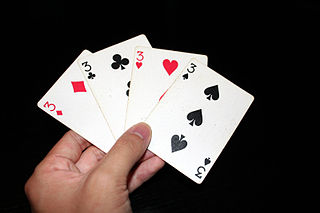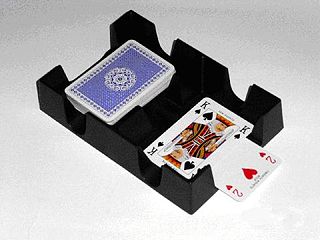
Gin rummy, or simply gin, is a two-player card game created in 1909 by Elwood T. Baker and his son C. Graham Baker. It is a variant of rummy. It has enjoyed widespread popularity as both a social and a gambling game, especially during the mid twentieth century, and remains today one of the most widely-played two-player card games.

Canasta is a card game of the rummy family of games believed to be a variant of 500 Rum. Although many variations exist for two, three, five or six players, it is most commonly played by four in two partnerships with two standard decks of cards. Players attempt to make melds of seven cards of the same rank and "go out" by playing all cards in their hand. It is "the most recent card game to have achieved worldwide status as a classic".

500 rum, also called pinochle rummy, Michigan rummy, Persian rummy, rummy 500 or 500 rummy, is a popular variant of rummy. The game of canasta and several other games are believed to have developed from this popular form of rummy. The distinctive feature of 500 rum is that each player scores the value of the sets or cards they meld. It may be played by 2 to 8 players, but it is best for 3 to 5.

Rummy is a group of matching-card games notable for similar gameplay based on matching cards of the same rank or sequence and same suit. The basic goal in any form of rummy is to build melds which can be either sets or runs. If a player discards a card, making a run in the discard pile, it may not be taken up without taking all cards below the top one. The Mexican game of Conquian is considered by games scholar David Parlett to be ancestral to all rummy games, which itself is derived from a Chinese game called Khanhoo. The rummy principle of drawing and discarding with a view to melding appears in Chinese card games at least in the early 19th century, and perhaps as early as the 18th century.

Shanghai rum is a Rummy card game, based on gin rummy and a variation of Contract rummy played by 3 to 8 players. It is also known as California rummy.
Tonk, or tunk, is a matching card game, which combines features of knock rummy and conquian. Tonk is a relatively fast-paced game that can be played by 2-4 players. It was popular with blues and jazz musicians in southern Louisiana in the 1930s, including Duke Ellington's orchestra, and was played during breaks in the back rooms of bars and saloons. It has been played in military barracks to the battlefield and In many other places it has become a popular pastime for workers while on their lunch breaks. It can be played for just points or for money wagered.

Liverpool rummy is a multi-player, multi-round card game similar to other variants of rummy that adds features like buying and going out. It is played the same as Contract Rummy, except that if a player manages to cut the exact number of cards required to deal the hand and leave a face-up card, then the cutting player's score is reduced by 50 points.

Contract rummy is a Rummy card game, based on gin rummy played by 3 to 8 players. It is also known as Combination rummy, Deuces Wild Rummy, Joker rummy and Phase 10.

Dummy rummy is a variation of rummy for two to four players. It is played with two standard decks of cards, including four jokers, for a total of 108 cards. The jokers and twos are wild.

Biriba is the Greek partnership version of a rummy card game of Italian origin called Pinnacola. The Greek name comes probably from the Italian game Biribara, or Biribisso, or Biribi, even if this game is totally different. It is played by two to six players, with two decks and 4 Jokers comprising 108 cards. If 6 players play, one more deck and two jokers more are added. Biriba can also be played by three players with or without partnership rules.
Three thirteen is a variation of the card game Rummy. It is an eleven-round game played with two or more players. It requires two decks of cards with the jokers removed. Like other Rummy games, once the hands are dealt, the remainder of the cards are placed face down on the table. The top card from the deck is flipped face up and put beside the deck to start the discard pile.

Bing rummy is a variant of kalooki invented in the mining towns of Alaska. The game can be played with 2 to 8 players but works best with 3 to 6 players. It is unknown how the game came to be called “bing” although it may be because of the mining terms: unit of weight equal to 800 pounds, or a pile of rich lead ore. It is probably the second definition that gives the game its name referring to the pile of coins that accumulate throughout the game; especially as it is the Galena lead mines that popularized the term “bing ore”. These mines opened in 1919 about the time the game was developed.

Continental Rummy is a progressive partnership Rummy card game related to Rumino. It is considered the forerunner of the whole family of rummy games using two packs of cards as one. Its name derives from the fact that it is played throughout the continental Europe, the United States, Mexico, Canada, and also in South America. According to Albert Morehead, it was "at one time the most popular form of Rummy in women's afternoon games, until in 1950 it lost out to Canasta."
Zioncheck is a card game. It is similar to shanghai rummy, contract rummy, or phase 10. Hoyle's book of common card games describes several games as being based upon it, and Contract Rummy is believed to have originated from it.

Carioca is a Chilean card game similar to Rummy style card games with many variations. The variation described below is Perla's Cariocas.

Chinchón is a matching card game played in Spain, Uruguay, Argentina, Cape Verde and other places. It is a close variant of Gin rummy, with which it shares the same objective: making sets, groups or runs, of matching cards.
Indian Cherokee Rummy is a card game in India with little variation from original rummy. It may be considered a cross between Rummy 500 and gin rummy. Indian Rummy is a variant of the rummy game popular in India that involves making valid sets out of 13 cards that are distributed among every player on the table. Each player is dealt 13 cards initially; if the number of players is 2, then a 52 cards deck is chosen for the game and if there are 6 players, two decks of 52 cards each is combined for the game. Each player has to draw and discard cards by turns till one player melds his/her cards with valid sets that meet the Rummy validation rules. It could be that Indian Rummy evolved from a version of Rummy in South Asia, Celebes Rummy, also called Rhuk.

Kalooki or Kaluki, is a version of Contract Rummy popular in Jamaica, and it has become known as Jamaican Rummy. A version called "Super Kalooki" is played in tournaments while a version called "Baby Kalooki" is often played with children or for purposes of teaching the game. There are a few variations of the game described in books and on the internet. A similar game is sometimes referred to as "Kalooki 40".

Marriage, Marriage Rummy, often called 21-cards rummy, is a Rummy card game, widely played in India using three or more packs of cards.

German Rummy or Rommé is the most popular form of the worldwide game, Rummy, played in Austria and Germany. It is a game for 2 to 6 players and is played with two packs of French playing cards, each comprising 52 cards and 3 jokers. There are no partnerships, every player plays for him- or herself. In Germany, the Germany Rummy Association is the umbrella organisation for local rummy clubs and organises national competitions. The game is often just known as Rommé in Germany and Rummy in Austria.





